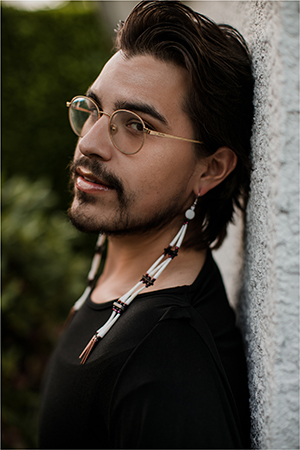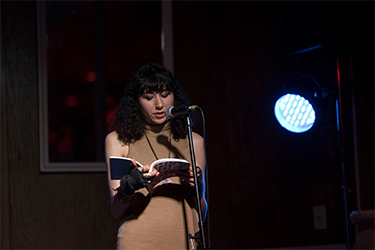The Body Remembers: Safiya Hopfe in Conversation with Joshua Whitehead

Malahat Review volunteer and past work-study student Safiya Hopfe talks with Joshua Whitehead, winner of the 2020 Open Season Award for creative nonfiction with his essay, "Who Names the Rez Dog Rez?"
Joshua Whitehead is an Oji-nêhiyaw, Two-Spirit member of Peguis First Nation (Treaty 1). He is the author of full-metal indigiqueer (Talonbooks 2017) and Jonny Appleseed (Arsenal Pulp 2018). Currently, he is working on a forthcoming manuscript with Knopf Canada entitled Making Love With the Land which details Indigeneity, mental health, and queerness.
In the opening line, you say that while reading, "I let the words find me because the body always knows better than the mind does, muscles remember, they witness [...]" Does this hold true in your writing process? What does your writing process look like, usually?
My writing process, least of all for this essay which is part of a collection of creative non-fiction I’m working into a manuscript, is rather erratic. Detailing such wrought and rendered memories is a lot like extraction in which I’m asked to animate pain. And I don’t have a particularly good memory, but, the body always remembers: sensorial, it harkens me back to moments from which I can write. I think there’s a particularly apt skill many writers adopt, which reminds me of Hilton Als, who in White Girls, and I paraphrase here, noted that he didn’t quite experience a kiss fully until he wrote it out—I’m trying to navigate the ethics of mining the body as a site of extraction with the morality of living life for the sake of pimâtisiwin rather than mechanizing my body as a surveyor. This undoubtedly slows my writing process, which has been something different for me in the vein of non-fiction vs. the novel or poetry, in that as I write, I exhaust myself to the point that a paragraph can cost a handful of hours and a storm of mourning.
This piece seems to explore stories as body-memory and earth-memory. You declare that “muscles remember” early in the piece, later referencing the “roots of me, an ecosystem of pain.” What role do you think writing plays in understanding, releasing, and healing the stories held in flesh?
I think writing can be an exorcism of sorts, one that rather than removing a revenant from the structure of one’s home, or body, it asks, least of all for me, to think of pain or joy or wounds or scars as kin I house and am accountable for; it asks me to rethink my mental health as ancestral knowledge in lieu of thinking of it as a virus to a host. Like, what does anxiety protect me from? How does insomnia craft worlds in dreamscapes? How does an eating disorder account for intergenerational wounding? In order to do this, I find myself having to invoke nêhiyâw laws: wâhkohtowin, miyopimâtisowin, pimâtisiwin—that is, I live my life through the enactment of accountable interconnectivity to all relations: human, non-human, the genomic, the affective and all of this, folded together, allows me to enact “the good life.” Such that, when I think of the word body, it cracks open into a web of signs: my body, the river body, the mountain body, the prairie body, the rez dog and the multiplicity of wounds that all ache to storytell from clogged pores and ingrown hairs. Does writing release? Perhaps, but I prefer to think that writing sutures so as to make space for one to live wholly in a body whose zipper is missing teeth.
Is there a “truth” you are in pursuit of when you write creative nonfiction? Is there a significant difference between fiction and nonfiction, for you?
The truth I am trying to interrogate is, in its most essential form, settler colonialism and its impacts upon a queer Indigenous femme-nâpew and how those effects ripple across time so as to map out a lineage of wounds all of which hold their own forms of knowledge governance. Mourning, assault, loss, joy, beauty, terror—these are all themes I implanted into this essay but what I’ve come to realize is that I am not writing to anyone but myself even if I’ve peppered the essay with pronouns. I let the body guide the story which asks me to become a rez dog and in such a transformation, I maintain the agency over those who seek to inflict or infect me with pain, I become the storyteller, creator, and in such a tasking I’m asked to morph into metaphor, a more universal register. In such a way too, it’s been multiple conversations I’ve had with many people about the topics I am broaching here, difficult narratives, difficult truths that I have avoided about my mental health for a damning period of my life. I owe a great deal to the beautiful observations and remarks that my therapist has made in our six months of working together. In writing this, I am asked to be more honest with myself and with you, I am given a guideline on how to be as resilient as I am on the page and to transfer that to my life, to merge the voice with the body. And honesty, for me, opens so many doors, crafts webbings of kinship between those who I would have otherwise thought I had no common ground with. Honesty becomes more paramount to me in the genre of non-fiction rather than fiction, inasmuch that I have no character to hide behind: Jonny Appleseed doesn’t come to mask my intentions or ZOA from full-metal can’t disembody me into binary when I need to escape—it’s simply me, on the page, stripped, voyeur, a peeping into the sovereignty of this machine I call a body and yet, I too have agency in widening or lessening the hole from which you gawk at glory because I control the eye of my “I.” Perhaps there is no truth then, there is only narrative, and in orating story, it becomes my truth—and that’s enough for me.
You use both "I" and "you" in your piece: "I look at the you’s that have harmed me in ways, big or small, and will you all to stone [...]" You later question who this "you" might be: "The circularity of a second-person address chokes me, who is the you I am addressing?" and "ain’t that the funniest thing about non-fiction writing? That the 'you' I keep invoking is multifarious, shattered glass, and I have only ever really been talking to myself." The use of "you" seems to shift and be put into question. This made me wonder who this "you" is, ultimately, and who you write for, or to, in this piece?
There are several people animated into story within this essay: aggressors, lovers, friends, ancestors. At first, I had a difficult time trying to make this story because it’s about sexual assault, I was only able to do so if I placed myself into the body of another, a rez dog, because it was easier to survive this extraction as a metaphor rather than as a body. And the second person address was initially used to maintain a veil over those I am accountable to—it is also built out of fear, that to name is to make an event all too real. As I finished the essay, which too becomes a kind of perfect storm, eye of hurricane, fevered dream of my mental mappings, I came to realize that it doesn’t matter who “you” is because there never was anyone but me sitting and talking amongst a plethora of mirrors. The “you’s” are simulations that I have made, characters, even if this is non-fiction. If I am happy with my truth, then I must reckon with the fact that there is no truthful “you,” there is only ever addresses and I am attempting to circle the perimeter of myself, the hearthome. Like the Maggie Rogers song I reference, the “you’s” are reduced here to keys that I am using to simply get back into my body—a game of cat and mouse between voice and self.
This piece begins with you reading Ocean Vuong’s "On Earth We’re Briefly Gorgeous." Does the work of other creators often inspire you to create from a particular angle? What work have you read recently that has particularly excited you?
Vuong’s novel was quite seminal to my writing and thought projects within this essay (and the larger manuscript). I’ve also been wholly informed by Terese Marie Mailhot’s Heart Berries, Alicia Elliott’s A Mind Spread Out on the Ground, Kaitlyn Purcell’s ʔbédayine, Carmen Maria Machado’s In the Dream House, Anne Mehler Paperny’s Hello I Want to Die Please Fix Me, Sarah de Leeuw’s Where It Hurts, Heather Christle’s The Crying Book, and the forthcoming non-fiction of Billy-Ray Belcourt, A History of My Brief Body and Jordan Abel’s Nishga. I’m inspired by these writers because they are so adamant and unabashed about inspecting pain, but at the same time, they are also “telling” on themselves (as Tommy Pico notes in his shared podcast Food4Thot), they are truthful and accountable to pain—I think there is a grand mode of ethical storytelling found in non-fiction.

Safiya Hopfe
* * * * * * * *









